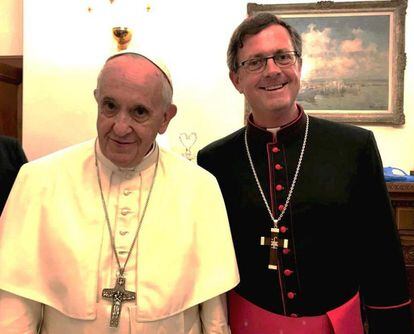Pope Francis with Jorge García Cuerva, in a file image. RR SS
Pope Francis named the new archbishop of Buenos Aires on Friday. The priest Jorge García Cuerva, current bishop of the Patagonian city of Río Gallegos, will succeed Cardinal Mario Poli, who turned 75 last December and to whom canonical norms impose retirement. The designation responds to that formality, but in Argentina it has been read as a political message. Garcia Cuerva, 55, is one of those priests who respond to what the pope often calls "shepherds with the smell of sheep" or "slum priests," for his work in the popular settlements surrounding Buenos Aires.
Cuerva will now occupy the same position that Francis had, as Jorge Bergoglio, between 1998 and 2013, in a context in which the Catholic Church asks for a priest of his profile: poverty in Argentina has reached 40% of the population in the midst of an economic crisis unprecedented in 20 years, while the country looks with uncertainty at the elections next November and the Pope prepares his first visit to the country for 2024.
The role of archbishop of Buenos Aires is the key square for Vatican policy in Argentina. The mandate of Jorge Bergoglio, who left that office in 2013 when he was proclaimed pope, was marked by tensions with the government. Every May 25, when Argentina commemorates the beginning, in 1810, of its independence feat, the president usually attends a mass in the cathedral of Buenos Aires to listen to the homily of the archbishop of the city. Néstor Kirchner, who took office in 2003 after years of crisis, only heard it twice. In 2005, two years into power, Bergoglio called on politicians "not to cling to strident announcements instead of betting on predictable projects," "not to bastard or eliminate institutions" and "not to fall into hatred, disorientation and immaturity." The following year, the president decided to celebrate Fatherland Day in the provinces. For Kirchner, Bergoglio was the "spiritual leader of the political opposition," although he had also been tough on his predecessors. "It would seem that the public and common good matters little as long as we feel the ego satisfied," Bergoglio said in his last homily, in 2013, when Néstor Kirchner had been dead for three years and his wife, Cristina Fernández, was serving the penultimate of her eight years in the presidency. She didn't go to listen to him either.
Cardinal Mario Poli had a less political profile than his predecessor. For the 2014 celebration, the tradition was reinstated and Cristina Fernández de Kirchner returned to the cathedral while in power. In his homily this week, in which he said goodbye to office, Poli called for dialogue in the middle of the election year and asked the politicians present, including President Alberto Fernández, to stop "fueling the confrontation by looking for culprits in the past." Fernandez celebrated his words.
Poli resigned last December, after months in which his relationship with the pope soured. In May 2022, a Vatican audit personally commissioned by Francis had found irregularities in the sale of clergy real estate in Buenos Aires and the pope urged his successor to limit his delegation's economic transactions to those "strictly necessary." Francis admitted his resignation in April but asked him to remain in office while he searched for his successor.
Jorge García Cuerva was not among the names that were shuffled these weeks in Argentina, but his appointment coincides with the image that Francis has sought to impose on the Church. A lawyer, theologian and ordained priest in 1997 in the diocese of San Isidro, a wealthy municipality on the northern outskirts of Buenos Aires that is also home to one of the best-known slums in the urban area of Buenos Aires, García Cuerva was parish priest of three popular neighborhoods in the area while Bergoglio was the cardinal of Buenos Aires. He was also chaplain of different regions of the province of Buenos Aires and regional representative of the Prison Ministry. The cardinal of Buenos Aires is the fourth assignment given to him by Pope Francis. In 2017 he was appointed auxiliary bishop of Lomas de Zamora, another municipality on the outskirts of Buenos Aires marked by poverty; in 2019 he became bishop of the province of Río Gallegos and in 2021 he joined the Dicastery for Bishops, a Vatican body that advises on episcopal appointments.
His 2019 appointment was traveled by the current Minister of Economy, Sergio Massa, one of the leaders of the ruling Peronism who met him more than a decade ago when he was mayor in the north of Buenos Aires. Many Argentine media are now looking for signs about his political thinking. Vocal against injustices, García Cuerva seems so far impartial in his rejection of power. "When we couldn't get together, or vaccinate our grandparents, they were vaccinated and they were there. Politicians did not suffer the restrictions of the pandemic and that's why they didn't understand what was happening to people," he denounced in a 2021 interview, months after scandals over gatherings amid strict quarantine or jumps in line at covid-19 vaccination cornered the government. García Carva will take office as archbishop in July, and because of the preponderance that his new role takes, he can be appointed cardinal.
Subscribe here to the newsletter of EL PAÍS América and receive all the informative keys of the current situation of the region.

